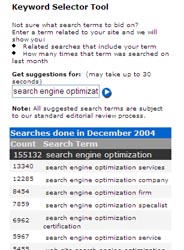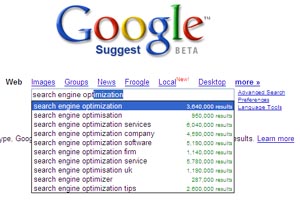Keyword Research
If you target the wrong keywords all your efforts in search engine optimization will be in vain. The right keywords are not only the ones relevant to your business but are also popular with searchers.
The process of keyword research involves using some online tools to estimate the popularity of keywords amongst search engine users and then take into account the competition for the top rankings for those keywords.
Step 1
Check the popularity of keyword searches starting with Overture’s free search engine suggestion tool. This tool is based on data from all searches on Yahoo! over the past month as well as other Overture partner sites. Use of this tool is free, but there is a downside – the verb tenses, plural and singular forms, and misspellings are all aggregated together, so you’ll have no sense of how popular a variation of a keyword (such as a misspelling) is, in comparison with the main form of the word. It is especially frustrating if you have no sense as to how popular the plural form is versus the singular. The rule of thumb that normally holds up is the plural form is more popular than the singular form. That is not always the case, and to what degree it is the case varies, depending on the keyword.


Overture’s and Google’s free tools
Step 2
Now let’s have a look at Google Suggest – another free tool. This tool, however, will only suggest based on variations on what you have typed in, rather than new combinations of terms or replacing terms you suggest. However, it can be useful inspiration when looking for new keywords.
Step 3
There is a tool that allows us to see the sorts of variations highlighted in Step 1. That tool is WordTracker. WordTracker is a subscription service. It costs $260 per year. The database is based on searches done on Dogpile and MetaCrawler over the last 60 days. Dogpile and MetaCrawler are two minor search engines owned by InfoSpace; together they account for less than 1% of the search market, still there is enough data there to get statistically significant comparisons between the popularity of various keywords.
This tool also offers some advanced functionality, such as the ability to build projects which contain groups of keywords that you can do research on and import into Excel and search for synonyms.
It even allows you to calculate KEI scores automatically. (KEI scores will be discussed in further detail in the next step.)
Step 4
Take the competition into account. Using the above-mentioned tools, you may find some great keywords that are relevant to your business and extremely popular. However achieving a Page 1 ranking in Google for these keywords may be nearly impossible — IF the competition is high and the competitors are very savvy when it comes to SEO.
One simple way to take the competition into account when analyzing keyword markets is through calculating KEI scores. KEI stands for “keyword effectiveness indicator”. It is simply a ratio of keyword popularity over the number of search results returned when you type that keyword into Google or another search engine.
Note that each search engine yields unique KEI scores. Typically we run KEI calculations for both Google and Yahoo! The higher the KEI score, the more attractive the keyword is to target, assuming of course it is relevant to your business.

Chapter 6:
Keyword Research
From the fundamentals of link building to the nuances of natural linking patterns, virality, and authority.
Related Posts

Embrace Journaling, Tackle Tardiness, and Explore Our Energetic Echo
Here’s what I found inspirational, challenging, or just downright hilarious this week. What caught your eye? And, remember to check out this week’s great podcast episodes: Scaling a SaaS Company with Jason Morehouse “A crucial factor to business success is to find and take the personal path that works best for you.” — Jason Morehouse […]
Read More
Harrison’s harmony, conquering a blank canvas, & gut health hacks
Here’s what I found inspirational, challenging, or just downright hilarious this week. What caught your eye? And, remember to check out this week’s great podcast episodes: Be a Sales Game Changer with Fred Diamond “True elite sales professionals develop a dedicated mindset, proactive client interaction, and continuous self-preparation. They understand their client’s needs and enable […]
Read More
Rebirth of sleeper trains, 4,000 weeks is a long/short time, and golden age for medicine
Here’s what I found inspirational, challenging, or just downright hilarious this week. What caught your eye? And, remember to check out this week’s great podcast episodes: A Story Worth Retelling with Luke Storey “Aligned values are the cornerstone of successful partnerships, whether in business or life, as they shape our moral code, define our priorities, […]
Read More
